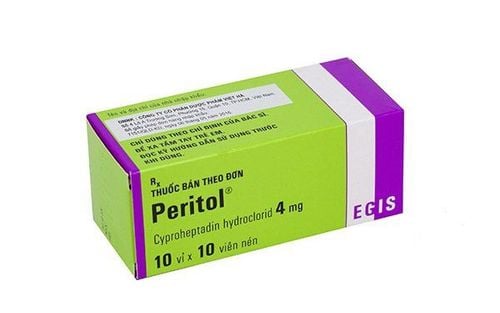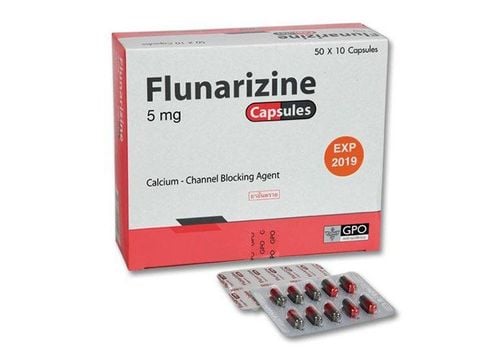Peritol 4mg contains the active ingredient cyproheptadine hydrochloride, indicated in the treatment of allergic conditions accompanied by itching. Let's learn about the uses and dosage of Peritol through the article below.
1. Uses of Peritol
1.1. Indications
"What is the effect of Peritol?". Peritol contains the active ingredient cyproheptadine hydrochloride, which is used in the treatment of the following diseases:
- Allergic conditions with itching such as acute urticaria, chronic urticaria, itching, eczema, drug rash, eczematous dermatitis (skin inflammation), neurodermatitis, contact dermatitis, vasomotor rhinitis, insect bites, serum sickness (similar to an allergic reaction caused by certain medications);
- Symptoms of vascular headaches (histamine headaches, migraines).
1.2 Pharmacodynamics
Cyproheptadine belongs to the group of antihistamine - serotonin drugs, the drug has sedative and anticholinergic effects. The mechanism of action of Cyproheptadine has been shown to be binding to the histamine H1 receptor and the serotonin receptor, thereby competitively inhibiting the binding of histamine and serotonin.
Animal studies have shown that cyproheptadine hydrochloride antagonizes some of the effects of serotonin as follows:
- Bronchospasm (guinea pig experiment);
- Vasoconstriction (dog experiment);
- Spasm (isolated mouse uterus experiment);
- Edema (rat experiment);
- Lethal (haemophilus pertussis mouse experiment).
Animal studies have shown that cyproheptadine hydrochloride antagonizes some effects of histamine as follows:
- Bronchospasm (guinea pig experiment);
- Vasoconstriction (dog experiment);
- Spasm (isolated mouse uterus experiment);
- Anaphylactic shock (mouse and guinea pig experiment);
- Increased gastric secretion (Heidenhain pouch dog experiment).
1.3. Pharmacokinetics
Peritol is well absorbed from the gastrointestinal tract after oral administration. Peak plasma concentrations are achieved 4-8 hours after oral administration. The effect of cyproheptadine hydrochloride lasts for 4-6 hours after a single dose. However, drug concentrations can still be measured 24 hours after a single dose of 4 mg.
There are no studies demonstrating the relationship between clinical efficacy and plasma drug concentrations. The drug is metabolized mainly in the liver, the main metabolite is the quaternary ammonium of cyproheptadine (glucuronide conjugate). The metabolites have no biological activity.
The process of drug excretion is through feces and urine. In which, at a dose of 4 mg cyproheptadine, 2 - 20% of the dose is excreted in the feces (34% of which is in unmetabolized form), 40% is excreted in the urine. 50% of the amount of cyproheptadine is excreted through the kidneys in the form of metabolites within 3 days of taking the drug. At a daily repeated dose of 12 - 20mg, no unmetabolized drug is seen, but only the drug's metabolites are excreted in the urine. The half-life of cyproheptadine is 16 hours.

2. Dosage
Peritol is used in the treatment of allergic conditions accompanied by itching, headaches due to vascular causes. Dosage of the drug depends on the condition and age of the patient, specifically as follows:
- The effectiveness of the drug when used in a single dose lasts from 4 to 6 hours. The daily maintenance dose should be divided, usually 3 times/day or used regularly when necessary to maintain continuous effectiveness. However, the dosage needs to be determined specifically for each patient;
- The drug has a more sedative effect at the first treatment dose, so it is recommended to take the first dose after dinner;
- The starting daily dose for adults is 4 - 20mg (take 1 tablet/time x 1 - 5 times/day), most of the appropriate dose for patients is 12 - 16mg (take 1 tablet/time x 3 - 4 times/day);
- The recommended dose in the treatment of chronic urticaria (hives) is 2 mg/time x 3 times/day (1/2 tablet x 3 times);
- Dosage in the treatment of acute headaches: 4mg per day. If the pain persists, repeat the above dose after 30 minutes, noting that the total dose should not exceed 8 mg in 4-6 hours. The maintenance dose for migraine treatment is 12 mg/day (1 tablet/time x 3 times/day).
Dosage of Peritol 4mg for some special subjects:
- Patients who cannot move on their own, the elderly (over 65 years old): Peritol should not be used in these subjects because of the high risk of side effects;
- Children: Do not treat children under 2 years old with Peritol. The recommended dose for children over 2 years old is 0.25 mg/kg/day or 8 mg/m2. The recommended dose for children from 2 to 6 years old is 4-6 mg/day, the maximum dose should not exceed 12mg.
- For children from 7 to 14 years old, the dose is 8-12 mg/day. In case of needing to supplement the dose, it should be taken at bedtime, the maximum dose should not exceed 16mg;
- For patients with liver failure, the dose may need to be reduced because cyproheptadine is metabolized in the liver;
- For patients with kidney failure, the dose must be adjusted and reduced.
3. Undesirable effects
Some undesirable effects that may occur when using Peritol are as follows:
- Weight gain;
- Palpitations, extrasystoles, tachycardia;
- Leukopenia, hemolytic anemia, thrombocytopenia, agranulocytosis;
- Symptoms of nervous system disorders: somnolence, drowsiness, dizziness, sedation, ataxia, paresthesia, tremor, convulsions, neuritis, weakness;
- Eye disorders: Accommodation disorders, blurred vision, diplopia;
- Labyrinth and ear disorders: Dizziness, acute labyrinthitis, tinnitus;
- Respiratory and chest disorders: Thick bronchial secretions, dry nose and throat, nasal congestion, difficulty breathing, nosebleeds;
- Digestive disorders: Nausea, dry mouth, diarrhea, epigastric discomfort, constipation;
- Urinary and renal disorders: Difficulty urinating, frequent urination, urinary retention;
- Subcutaneous tissue disorders and skin disorders: Purpura, erythema, urticaria, photosensitivity;
- Nutritional and metabolic disorders: Increased appetite;
- Hypotension, feeling of suffocation in the chest, tremor, fatigue, irritability;
- Anaphylactic shock, allergic edema;
- Hepatobiliary disorders: Liver failure, hepatitis, cholestasis, jaundice, abnormal liver function;
- Reproductive system disorders: Early menstruation.

4. Notes when using the drug
4.1. Contraindications
Contraindicated use of Peritol 4mg in the following cases:
- People who are sensitive to any ingredient of Peritol
- People with acute asthma;
- People with glaucoma;
- Pyloric obstruction, gastric ulcer with stenosis;
- Patients with symptoms associated with urinary retention (bladder neck obstruction, prostate enlargement);
- Patients who are being treated with MAO inhibitors;
- Breastfeeding women;
- Elderly people with debility (over 65 years old), patients who cannot move on their own;
- Infants and children under 2 years old.
4.2. Notes when using
- Do not use antihistamines in the treatment of lower respiratory tract symptoms, including acute asthma attacks.
- Treatment with Peritol in particular and antihistamines in general can reduce alertness.
- However, for children, the drug has a stimulating effect.
- The drug has an anticholinergic effect, so caution should be exercised when used in the following cases: cardiovascular disease, hyperthyroidism, high blood pressure.
- Alcohol can increase the central nervous system inhibitory effect of antihistamines, so patients treated with the drug should not drink alcohol.
- Each Peritol tablet contains 128 mg of lactose. Therefore, patients with hereditary galactose intolerance, glucose-galactose malabsorption or Lapp lactase deficiency should not be treated with this drug.
- Although blood formation abnormalities such as agranulocytosis, granulocytopenia, hemolytic anemia, thrombocytopenia... rarely occur when taking Peritol. However, patients need to check their blood count in cases of unexplained fever, pallor, mucosal lesions, shortness of breath, weakness, bleeding...
4.3. Effects of the drug on special subjects
- Drivers, machine operators: When first starting to take the drug, the patient may experience drowsiness, dizziness or drowsiness. Therefore, the patient should not drive or operate machinery when first taking the drug.
- Pregnant women: Do not use Peritol in the treatment of pregnant women.
- Breastfeeding women: Do not use Peritol in the treatment of breast-feeding women.
To arrange an appointment, please call HOTLINE or make your reservation directly HERE. You may also download the MyVinmec app to schedule appointments faster and manage your reservations more conveniently.













